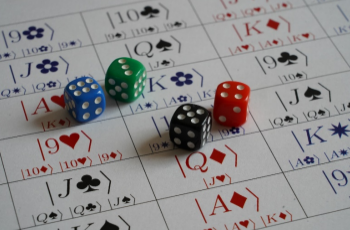Abstract. As quantum theory can be considered as a generalization of the classical probability theory, the sets of quantum states (density matrices) is strictly larger than the set of classical states - N-point probability vectors. In a similar way, the sets of quantum operations, quantum protocols, quantum algorithms and quantum technologies are larger than their classical counterparts. To demonstrate the quantum advantage, one looks in each setup for a quantum structure with extremal properties, as far away from the classical set as possible. In particular, the maximally entangled Bell-states of a two-qubit system form a known resource for quantum teleportation, quantum key distribution and quantum computing. In praxis one uses also higher multi-partite systems, for which the maximally entangled states are more difficult to identify. In this talk an analytical solution for the maximally entangled states of four quantum dice (four subsystems with 6 levels each) will be presented. Such a state can be considered as a solution of the quantum version of the famous combinatorial problem of 36 officers of Euler, as it can be visualized on a chessboard of size six, which shows that 36 quantum officers are split in nine groups, each corresponding to a maximally entangled two-qubit states. This state can be called golden, since the ratio of the amplitudes in the superposition of product states is given by the golden mean. Constructed state allows one to perform a new teleportation protocol and provides us a novel quhex quantum error detection code.

Four dice in the golden absolutely maximally entangled state of four-quhex, AME(4,6), corresponding to 36 entangled officers of Euler: knowing the outcome of any two dice determines the state of the other two. This is not possible if the dice are replaced by coins (qubits).
References:
[1] S.A. Rather, A. Burchardt, W. Bruzda, G. Rajchel-Mieldzioć, A. Lakshminarayan and K. Życzkowski, Thirty-six entangled officers of Euler, Phys. Rev. Lett. 128, 080507 (2022).
[2] D. Garisto, Euler’s 243-Year-Old ‘Impossible’ Puzzle Gets a Quantum Solution, Quanta Magazine, Jan. 10, 2022; https://www.quantamagazine.org/
[3] K. Życzkowski, W. Bruzda, G. Rajchel-Mieldzioć, A. Burchardt, S. A. Rather, A. Lakshminarayan, 9 X 4 = 6 X 6: Understanding the quantum solution to the Euler's problem of 36 officers, J. Phys.: Conf. Series 2448, 012003 (2023).
[4] G. Rajchel-Mieldzioć, W. Bruzda, A. Burchardt, K. Życzkowski, 36 splątanych oficerów z Petersburga, Delta 03/2023.
Lista terminów (Strona szczegółów wydarzenia)
- 12-12-2023 15:15 - 16:15